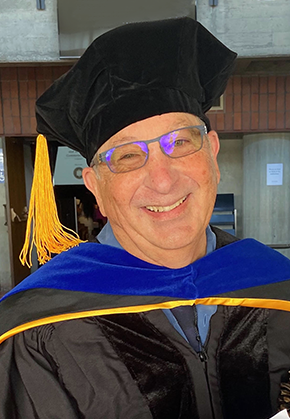Porter’s teaching and research has followed a few different trajectories. One is a study of Nietzsche’s thought, early and late (Nietzsche and the Philology of the Future and The Invention of Dionysus: An Essay on ‘The Birth of Tragedy’ (both Stanford University Press, 2000). Another is a study of models of aesthetic sensation, perception, and experience in ancient Greece and Rome, which he explored in The Origins of Aesthetic Thought in Ancient Greece: Matter, Sensation, and Experience (Cambridge University Press, 2010; pbk. 2016). A continuation of this inquiry is The Sublime in Antiquity (Cambridge University Press, 2016; pbk. 2020), which received the C. J. Goodwin Award of Merit from The Society for Classical Studies (2017). His most recent book is Homer: The Very Idea (University of Chicago Press, 2021; pbk. 2023), which captures some of his interest in classical reception studies. Porter has been co-editing a series called “Classical Presences” with Oxford University Press since 2005, the goal of which is precisely to promote this agenda. A further strand is Jewish literary and critical thought from Spinoza to Freud to Erich Auerbach (Time, History and Literature: Selected Essays of Erich Auerbach; Princeton 2013; pbk. 2016) and Rachel Bespaloff.

James Porter began teaching at the University of Michigan in Classics and Comparative Literature (1986-2007), and then at UC Irvine, Classics and Comparative Literature (2007-2015), where he served as Director of Critical Theory from 2014-2015. He has held visiting professorships at Princeton and Bristol University (UK) and has also taught at UCLA.
Ongoing and future projects include a collection of commissioned essays entitled Nietzsche and Literary Studies (Cambridge University Press, 2024); Existence, Tragedy, and Faith: Selected Essays and Letters by Rachel Bespaloff (Princeton University Press); a book on philosophical reflections about ecologies of self and world in Greek and Roman philosophy (Being Beyond the Self: Heraclitus to the Stoics); a study of Jewish scholars working in and on philology at its margins and in oppressed circumstances (Philology in Exile: Spinoza to the Present; University of Chicago Press), based in part on a course which was cross-listed with Jewish Studies in 2023; a continuation of his studies on Homer’s reception: Thinking Through Homer (Cambridge University Press); an introduction to a reissue of Rachel Bespaloff’s On the Iliad (Princeton University Press); an edition of Philodemus’ On Poems, Bk. 5 (under contract with Oxford University Press); and, down the road, a book-essay on the philosophy of life in antiquity and modernity. Porter will also be rounding out two trilogies with two further titles, Literary Aesthetics After Aristotle and The Seductions of Metaphysics: Nietzsche’s Final Philosophy. All of these topics spill over into his teaching, and many of them have begun their life there, “because I find that the classroom is one of the most productive places you can ever be.”
